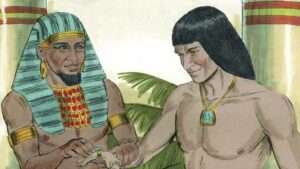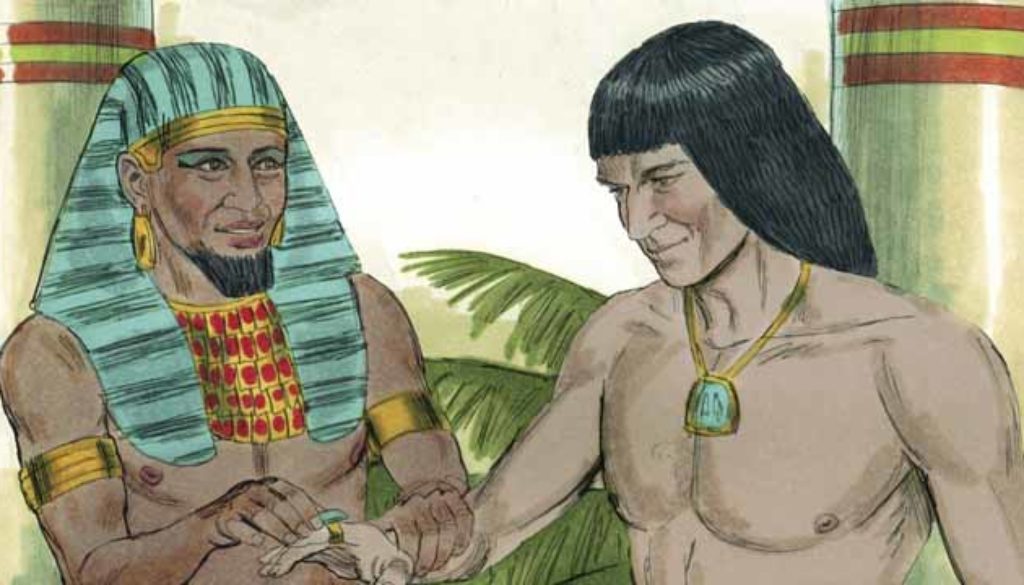Genesis 41:37-57 Promotion

We left off last time with Joseph interpreting Pharaoh’s dreams. This took him from the prison pit to the palace in mere moments. Now he moves even higher.
This is truly a “rags to riches” story in this moment. Joseph always had authority in whatever place he landed but he goes from the servant in the prison to the second place in ALL of Egypt. We left Joseph standing in Pharaoh’s court having just interpreted his dream and having given him some sound advice as to how to proceed following that interpretation. One could easily expect the highest ruler in the land to scoff at advice coming from someone straight out of prison.
♥ ♦ ♥
Joseph is no stranger to management duties. He was over Potiphar’s house and all he had. He was over the prison and all that happened there. His recommendation to Pharaoh spoke of his understanding of authority and management of resources.
Pharaoh didn’t know any of Joseph’s history beyond the fact that he was an interpreter of dreams and those interpretations came true. With the prediction Joseph just made, Pharaoh couldn’t afford to dismiss it. Besides all that, what Joseph said rang true in Pharaoh’s heart. God opened Pharaoh’s ears and eyes to the wisdom Joseph shared.
When Joseph was called out of prison, some of Pharaoh’s advisors scoffed at this idea. This was especially true of the “wise men” who had tried to interpret Pharaoh’s dreams. “Surely you are not going to listen to a slave! He is also a foreigner and knows nothing of our gods. What could he possibly say that would have any meaning for Egypt herself and her god Pharaoh?”
Pharaoh silenced them with a look and a single word; “Silence!”
These same men now stand near Pharaoh, blown away by Joseph’s interpretation and his recommendation. They have nothing negative to say at this point. There can be no better plan in all of Egypt. They eagerly await Pharaoh’s call for them to put it into action!
“Can we find a man like this, in whom is the Spirit of God?” (verse 38).
One of the “wise men” prepares to step forward and volunteer himself just as Pharaoh turns his back on him and addresses Joseph. “Since God has shown you all this, there is none so discerning and wise as you are. You shall be over my house, and all my people shall order themselves as you command. Only as regards the throne will I be greater than you” (verses 39b-40).
Joseph bows in respect to Pharaoh’s words. Murmurs can be heard around the room. “A slave to rule over us?” “No one will follow him, he is a foreigner.” “Pharaoh can’t be serious. It will never work.”
Pharaoh doesn’t have to hear their words to know that this installment of Joseph into such a high place will not go unchallenged. He is already on it. He speaks directly to Joseph and ignores the murmurs; “See, I have set you over all the land of Egypt” (verse 42).
Pharaoh then takes off his own signet ring and places it on Joseph’s hand. “Bring me one of my finest robes” he calls to one of his servants. The servant runs from the room as quickly as possible. He returns within minutes bearing a fine red linen robe along with the gold fasteners that traditionally accompany it. Pharaoh is very pleased with this selection and nods at his servant. Pharaoh places it himself over Joseph’s shoulders. He allows the servant to work the fasteners and drape it elegantly over Joseph. Pharaoh then takes the heavy gold band off his neck and places it around Joseph’s. No one dares question Pharaoh’s actions but there are stunned looks on several of the faces in attendance. Other faces show only open appreciation for Pharaoh’s actions.
Pharaoh recognizes that Joseph is an unknown and he would encounter severe resistance if simply sent off to do his new job. Pharaoh himself must introduce Joseph to the people of Egypt and put his stamp of approval on him.
Pharaoh calls for two of his chariots. He will ride in the first one and Joseph will follow in the second. Pharaoh’s servants will walk beside and behind calling out to the people. They carry Pharaoh’s explicit instructions. They call “Bow the knee!” to the people as they pass. The procession continues up to the temple of On. Pharaoh stops his chariot and is helped down by his servant. Joseph’s chariot stops too and he steps down. Pharaoh ascends the steps of the temple and motions to Joseph to join him. On the steps of the temple Pharaoh publicly proclaims Joseph’s authority to the people and to Joseph directly.
I am Pharaoh, and without your consent no one shall lift up hand or foot in all the land of Egypt” (verse 44). Pharaoh proclaims Joseph’s new name to the people, Zaphenath-peneah (which means “the expounder of secrets” or “saviour of the world”) and calls for Asenath, the daughter of Potiphera priest of On. Pharaoh joins them in marriage on the temple steps. This makes Joseph now an Egyptian ruler and not a Hebrew slave.
Pharaoh returns to his palace and Zaphenath-peneah (Joseph) begins the job he was ordained for. This ordination came through Pharaoh’s hand but it was placed there first by God.
For seven years the people enjoy the abundant harvests that the ground yields. But not all of it belongs to them. They are required to bring 1/5th of it to the storehouses in their cities. The harvest was so plentiful that the people barely noticed the portion dedicated to Pharaoh. Zaphenath-peneah had ordered construction of these storehouses as his first task. Now he records the contributions as they are filled. More storehouses were built when the first began to overflow. There is so much stored that it is beyond measure by the time the seven years ends.
Everyone in Egypt knew of Pharaoh’s dreams and their interpretation. They were watching and numbering the years as they flew by. Many people saved in their own storehouses also. They wanted to be prepared and able to care for themselves. This was especially true for those tilling the soil. Those in the city had money in abundance but not foodstuff to place in their own storehouses. They would rely on Zaphenath-peneah’s stores in the lean years.
Zaphenath-peneah (Joseph) and Asenath welcome two sons into their family during the years of plenty. God provided them first with their son Manasseh. He is named this as a tribute to God for helping Joseph during all his hard years in Egypt. He has never truly forgotten where he came from and how he got here but God’s grace has replaced what he lost for him. Their second son in named Ephraim. This is to honor God for all the abundance He has given Joseph while in Egypt.
The eighth year begins with little rain. The usual rainy season is nearly dry. Some crops grow but they are scrawny and pitiful looking. The wheat fields are splotchy and bare in more places than they are growing. Water is hauled by hand to keep what little there is growing from dying. The people recognize the fulfillment of Zaphenath-peneah’s interpretation of Pharaoh’s dreams.
Zaphenath-peneah kept Pharaoh’s storehouses closed and secure for some time. The people relied on their own provisions in the beginning of the famine. It would not do for the storehouses of Pharaoh to be squandered while the people still had the ability to meet their own needs. Zaphenath-peneah was being shrewd with Pharaoh’s goods. “When all the land of Egypt was famished, the people cried to Pharaoh for bread. Pharaoh said to all the Egyptians, ‘Go to Joseph. What he says to you, do’” (verse 55). Only when the people had nowhere else to turn were the doors open.
The storehouses were not opened for free to the people. These were Pharaoh’s goods now and had to be purchased for a price. All had profited during the years of plenty and were expected to prepare in this manner too for the lean years. Pharaoh would become even richer from the sales from the storehouse to the people. Moreover, people from other lands would travel to Egypt to buy food from Zaphenath-peneah as the famine was widespread. Pharaoh recognized just how wise a decision he had made in placing Joseph over this task.
♥ ♦ ♥
Father God, this is an amazing story. Sometimes I get upset that the people who contributed to the storehouses had to purchase back goods from it. I want them to have received back what they put in at no cost. But then how would the storehouses have been paid for. I guess they are paying a “storage fee” then. I can get behind that concept. But what about those who were like the grasshopper in the story of the grasshopper and the ants. The grasshopper never did any work but expected to be taken care of by those who did when the lean times came. Did Joseph turn the “grasshoppers” away? What about those who couldn’t work? Did they get turned away when coming for food? I can see the “grasshoppers” being left to fend for themselves, at least for a time, but not the disabled. YOU care for ALL of Your children, able or not!
You also did not condemn Joseph for his business sense in setting up this whole operation. I believe YOU gave him the plan and model for it all. He was being a good steward with what You had provided for him. This is how I need to be with what You provide for me too. It is not to be squandered on every whim but invested with thought. Care given to find the places where “my investment” can bring the most good and the best return. This DEFINITELY includes Spiritual return! I want to use ALL You give me to bless my family, physical and spiritual. Thank You for the abundance You have provided for me. Help me use it wisely!



